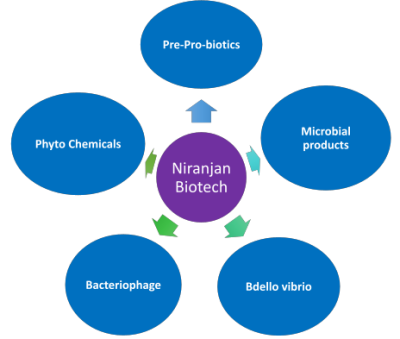The tangle of occurring of out breaks of bacterial infections in spite of using 4th or 5th generation antibiotic can only be solved by creating effective barrier of superior probiotic organisms to fight against superbugs from day zero after birth because of the fact that the victory in the race for winning the place in body between probiotic organisms and pathogenic organism depends on who reaches the target place/ i.e. intestinal wall first and faster that too with all the arsenals of defence.
We are approaching an era of antibiotic resistance. This is a very scary situation through the point of view of disease control. There is dire need for replacing antibiotics.
It can be said that end of antibiotic Era can thus prove as an opportunity for starting of post antibiotic Era of Probiotics, Bacteriophages and Phyto-Chemicals (mineral nano particles) against the war for wining over bacterial infections in livestock, poultry, Agriculture, Aquaculture and human society.

Imbalance of normal micro flora occurs due to modern diets and lifestyle, as well as environmental factors such as pollution and the irresponsible overuse of antibiotics. Probiotic can help to restore balance and cellular communications with regards to the body’s healthy bacterial population. Probiotics are live microorganisms that are intended to have health benefits when consumed in adequate quantities. Pre-Probiotics work on the principle of competitive inhibition against enteric pathogens.
We have bank of over 60 microbial strains, we can offer them in the form of a product of your choice or in the form of pure culture.
We can offer Bacteriophages for veterinary use against common gut pathogens like Salmonella, E. coli etc.
Phyto chemicals with mineral nano particles can be used as feed supplements to boost growth and production in place of, antibiotics being used in feed industry.
This is a genus of Gram-negative, obligate aerobic bacteria. One of the more notable characteristics of this genus is that members can prey upon other Gram-negative bacteria and feed on the biopolymers, e.g. proteins and nucleic acids, of their hosts. They have two lifestyles: a host-dependent, highly mobile phase, the “attack phase”, in which they form “bdelloplasts” in their host bacteria; and a slow-growing, irregularly shaped, host-independent form.